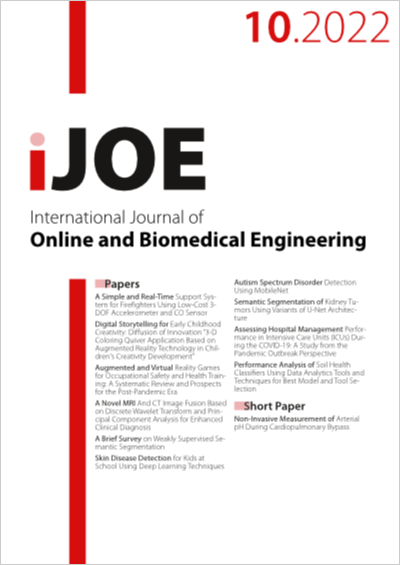Non-Invasive Measurement of Arterial pH During Cardiopulmonary Bypass
DOI:
https://doi.org/10.3991/ijoe.v18i10.31523Keywords:
Cardiopulmonary bypass, arterial pH, glucose, PaCO2, ordinary least squareAbstract
Blood pH is an essential parameter to determine the patient's acid-base status during cardiopulmonary bypass. To date, continuous pH measurement is usually done by continuous blood sampling using an expensive disposable sensor. This paper shows the feasibility of measuring arterial pH from the partial pressure of carbon dioxide (PaCO2) using arterial blood gas analysis. Further, the effect of hyperglycemia on pH estimation is included to show the necessity of combining glucose monitoring with PaCO2 monitoring.
245 blood samples from patients who underwent cardiopulmonary bypass were used. Patients with renal failure were excluded from the study. In this study, three groups of samples were included, A: all blood samples, B: blood samples with glucose ≤ 200 mg/dL, and C: blood samples with glucose > 200 mg/dL. A linear approximation based on the least-squares criterion was used to derive the best-fit equation.
Our results indicate that there is no significant difference among the models. Further, there is a significant association between arterial pH and PaCO2 with a p-value < 0.001 and RMSE of about 0.04. The present findings highlighted that arterial pH could be estimated from PaCO2. Additionally, hyperglycemia did not affect the hypothesis of the general relationship between pH and PaCO2.
Downloads
Published
How to Cite
Issue
Section
License
Copyright (c) 2022 Basma Faihan, Hussein H. Alzubeidy , Ziad T. Al-Dahan

This work is licensed under a Creative Commons Attribution 4.0 International License.


